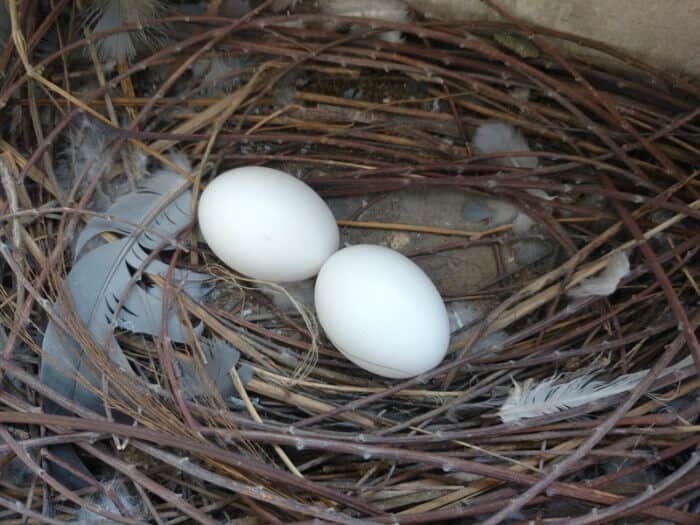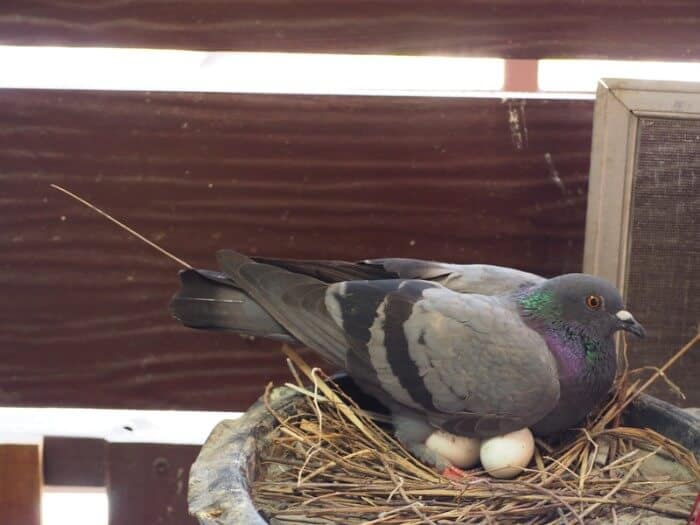Whether you are just curious or keep pigeons as pets, learning more about their mating and reproduction habits can be either educational or helpful in caring for your birds.
You’ve no doubt heard that baby pigeons don’t exist, but this is a fun conspiracy theory that’s been debunked by ornithologists all over the world.
Pigeons usually lay two eggs at a time though in rare cases they can lay three eggs.
Conspiracy theories aside, if you have pet pigeons or want to breed them, it’s a good idea to know how many eggs does a pigeon lay and what to expect when eggs are laid.

When to Breed
Though a pigeon reaches sexual maturity by seven months of age, most experts recommend waiting to allow them to mate until they’re a year old. Pigeons often mate for life and enjoy monogamous pairings with each other.
When the male and female decide to mate, the male will bring the female a stick to start their nest and show his interest. Together, the pair will build a nest and prepare it for eggs. Sometimes a pigeon couple will build two nests and the female may even lay eggs in both of them.
When Do Pigeons Lay Eggs
Once the nest is ready, the female will get ready to lay her eggs.
Approximately 10 to 14 days after mating occurs, the female will lay the first egg.
This egg is typically laid during the early evening hours.
About 44 hours later, the female will lay her second egg.
In most cases, there will only be two eggs in the nest, although very young or older female pigeons may only lay one egg.

Once both eggs are in the nest, incubation begins in earnest.
The female will generally incubate the eggs from evening to midmorning, then the male will take over until early evening comes back around.
Also Read: How To Care For A Pigeon Egg
What do the Eggs Look Like?
Most of the time, pigeon eggs are small and white. Sometimes they may be a pale blue or brown color and could have spots as well. If you breed pigeons, you will likely notice that they typically look some variation of white, however.
If you’re worried that an egg doesn’t look right, talk to your veterinarian, but don’t try to remove it from the parent pigeons without being advised to do so.
Something that’s interesting to note about the color of a pigeon’s eggs is that they may vary in hue between tame pigeons and wild pigeons. Scientists have learned that temperature plays a role in a bird egg’s color.
For pigeons you keep at home in the warmth of your house, the eggs may be lighter. Eggs laid in the wild could be darker and may look brown because this darker temperature helps trap heat inside the egg to a greater degree, which offers more protection for the baby and ensures a proper incubation period.
There are some other theories about why a pigeon egg will be the color it ends up being. One idea is that the egg color provides some camouflage so that the developing baby is safe from predators if the parent pigeons aren’t incubating for some reason.
Another idea is that the color of the egg protects it from the damaging UV rays that may reach it in the wild.
Other theories suggest that a bird’s egg color helps the mother and father bird differentiate it from other species and could also have antimicrobial properties that help ensure the health of the pigeon as it develops.
If you plan to breed your pigeons, it’s a good idea to get familiar with what their eggs look like so you can identify potential problems. Just remember that it’s not a good idea to handle your pigeon’s eggs as care needs to be left up to the parents.
If, for some reason, your pigeons aren’t caring for their eggs, talk to your veterinarian about what you can do. Otherwise, all you have to do is sit back and wait for those eggs to hatch.
